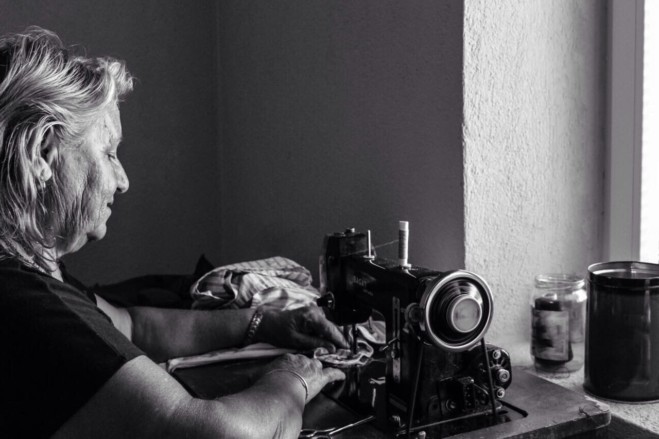For many women from Deҫan, handwork is not only an element of tradition that has been preserved for generations, but also an occupation to sustain their households.
Albeit they don’t profit much from it, they still zealously continue their work . They love the work they do and say that they have no other choice.
Most of them are middle-aged women or older, who did not have the opportunity to pursue their education.
Aferdita H., 40 years old form Deçan, together with her sisters-in-law Besa and Hedije, is into creating hand-made traditional costumes, that are worn by the bride on the second day of the marriage.
“I knit socks, whereas my sisters-in-law make the shirt, the vest (jelek) and the traditional aprons (known as pshjellakët). Although a slow and arduous work, I am happy that people in Deçan still keep the tradition alive and buy traditional costumes,” Aferdita says.
She says that her husband’s salary is not sufficient to afford the education of their five children.
“This is how we can afford the education of our children, since we could not afford our own education, and this is the only way I can contribute to the household,” Aferdita informs.
Zyle Balaj 68, from Strellc, a village of the municipality of Deҫan says that she started hand-knitting when she was nine years old. Today she makes traditional pants (so called tirq) for men and traditional Rugova costume for women.
“This is how I financially sustained my family earlier, while today, although my son has a job, me and my daughter-in-law continue to preserve the tradition. We too, in our way, want to contribute to our household economy,” Balaj says.
These women work in coordination, and they sell the costumes to clients who usually come to their homes. Others who are interested in buying these traditional costumes, can buy them in Peja’s market every Saturday. These costumes are available also in the building that used to be a mill, and today, with the permission of municipality of Deҫan, is being used by NGO “Jeta”.
The founder of the NGO “Jeta” in Deҫan, Safete Gacaferri says that the mill, where these items produced by these women are sold, is yet another attractive place for Kosovo citizens and tourists.
“It is very appropriate to promote the work of these women who did not have this chance until now,” the head of “Jeta” association, Safete Gacaferri says.
This organization has 280 members, who exhibit their products, usually handicrafts, for some revenue.
NGO “Jeta” has carried out many activities, with women heads of households benefitting the most: women from martyrs’ families, households with no head of the family, or women that, for various reasons, could not integrate into society.
Fitore Shala, a sociologist, from Dubovik, a village of municipality of Deçan, the founder of the NGO “Mbroji te Drejtat Tua” (Protect your rights), that deals with the empowerment of youth, says that this is a necessary and very important step towards making these women an active part of the society and provide the wellbeing of the family.
Bern “Neufield” high school students visited the mill and were amazed by the work of these women.
“One of them asked if everything was really hand-made,” Gacaferri tells with pride and a smile on her face.
The tradition of handwork for a lot of women of Deçan, on the one hand is an attempt to preserve the tradition of this part of Kosovo, while on the other hand it is an opportunity to provide some revenue for a decent life.
Since the beginning of this year, out of 138 people employed in the civil service, 107 are men and 32 are women, according to the statistics of the municipality of Deçan. Other sectors also have more men than women employed.
There are more women only in the health sector; with 84 out of a total of 120 employees.
Fjolla Hajrizaj (Photo: Diellza Balaj)








